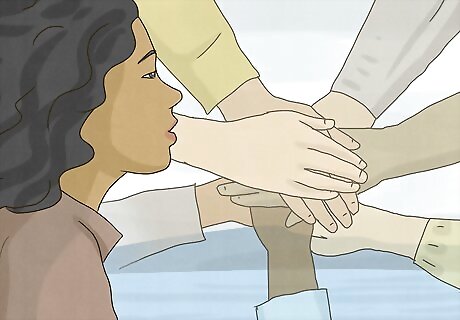
views
Stay calm during the name calling.

He’s doing it to get a rise out of you. It’s difficult not to react, but if you get angry, he might use that to internally justify more name calling. Take a deep breath and try not to take his name calling personally. You didn’t cause his behavior and you’re not responsible for it. His name calling is about his own emotional immaturity and doesn’t have anything to do with you or anything you’ve done. Name calling is a form of manipulation. It loses its power if you refuse to take the bait and stay unbothered (on the outside).
Speak to him directly about it.

Your words are your strongest weapon against verbal abuse. Wait to talk to him until you’re both in a good mood, preferably not right after he’s called you a name. Be honest but sensitive while you bring up his behavior, state your feelings clearly, and be straightforward when you ask him to stop. You may have to repeat the conversation before you notice results. Some conversation openers might go like this: “Hey, I want to talk to you about something you said earlier that hurt me. You called me a loser, and I have a real problem with that.” “Do you have a minute to talk? There’s something that’s bothering me. I feel like I’m not doing anything to justify you calling me names, and I want it to stop.” “I want to be open with you about something that bothers me in our relationship. I feel horrible when I get called names, and it makes it hard to take our conversations seriously.”
Be assertive when you talk to him.

You want to be firm and sincere without appearing aggressive. Keep a neutral facial expression on to appear calm, and project confidence by using tall, open posture while you’re talking. Maintaining eye contact also shows you’re serious, and he’ll be more likely to respond positively to you. Too much eye contact can read as aggressive. Shoot for looking in his eyes no more than about 70% of the conversation. Lean toward him slightly while you talk without getting in his personal space, and avoid “hand talking” or big gestures. It might be helpful to practice your body language in a mirror beforehand. Aim for a normal, conversational tone. You don’t want to be noticeably softer or louder than usual.
Explain why it makes you feel bad.

He might not understand the impact of his words. Use “I” statements to share how you feel when he calls you names, since “you” statements sound more accusatory or aggressive. This way, you can communicate your feelings about the situation without centering it around him. Try statements like: “I feel humiliated when I get called those names.” “I don’t respond well to name calling. There are better ways to communicate problems with me.” “I don’t like being called that word.”
Make declarative statements to stand up for yourself.

Name calling is a way to wear you down and control you. Challenge him with a simple declaration like “Stop that” or “That’s insulting to me.” He’s probably not expecting you to stand up for yourself, and your clear and direct tone will catch him off guard. This communicates how you want to be treated each time he calls you a name. More forceful statements might be: “Stop calling me names.” “That’s childish.” “Do not use that word with me again.”
Ask him what he meant by using that name.

Asking for clarification shows you’re not happy about his words. This approach is most effective when you ask him right after he calls you a name. He’ll probably be thrown off and realize how childish he sounds. Using a question is a softer form of confrontation than an accusation, and his answer might give you more insight into why he’s acting like this. Try using one of these lines: “Excuse me, what do you mean when you call me that?” “Can you tell me why you felt the need to call me that?” “I don’t understand why you’re calling me that. Can you tell me?”
Set boundaries with him.

Shut down any interactions where he refuses to stop name calling. This will show him you won’t tolerate it and you’re not dealing with it going forward. He’s resorting to name calling because he doesn’t have any more mature communication tools left, so be the bigger person and disengage. Try some statements like these: “Quit it with the name calling or we’re done with this conversation.” “If you can’t stop calling me names, I’m going to leave the room.” “Find a nicer way to talk to me or I’m sleeping on the couch tonight.”
Follow through on your boundaries or ultimatums.

Consistency in your follow through weakens his name calling’s power. By continually setting and sticking to your boundaries, he’ll get the message that his verbal abuse isn’t effective anymore. Following through is an important step in rebuilding your self-esteem and sense of control of the situation. For example: If you say you’re going to leave the room if he calls you a name, you should actually leave if he does it. If you say you’re done talking to him until he finds nicer words, ignore him until he changes his language. Start with small, manageable boundaries as you get more comfortable with standing up to him. Your relationship might not change right away, but you will feel confident after each small victory.
Acknowledge his positive changes.

Positive reinforcement is a powerful way to encourage change. People usually think of parenting when they hear this, but it works very well on adults as well. When he talks to you without using names or shows other genuine signs of emotional maturity, praise him to show that you notice and appreciate his efforts. Say things like: “Thank you for communicating with me more respectfully. I really appreciate it.” “I’ve noticed all the effort you’re putting in for me. Thank you.” “I feel closer to you now that we’re talking to each other nicely.”
Build a support network with trustworthy people.

It’s hard to stand up to consistent abuse without support. Your friends, family, or therapist can validate your feelings and provide a safe space away from his name calling and verbal abuse. Without an outside perspective, you might be more susceptible to lower self-esteem, doubting yourself, and believing in the names he calls you. It’s ultimately up to you to decide if his behavior is a problem for you or your relationship. However, support and opinions from friends and family can help you make decisions and affirm your choices to make change.
Know your self-worth.

Your boyfriend’s decision to name call doesn’t diminish you. Only you get to decide how you feel and what you’re worth. Show yourself compassion and forgive yourself for any shame, regret, or guilt you might have felt as a result of his behavior. Accept your feelings as they are, and then let them go. Try an activity or a hobby that you love and excel at to clear your mind from the name calling and give yourself a quick self-esteem boost. Cut out the word “should” when you think or speak about your feelings and actions. Instead, use “could” to open up more possibilities. For example, instead of “I should go back to the couch with him,” think “I could go back to the couch with him…but maybe it’s best if I take some time for myself.”
See a relationship counselor if talking doesn’t work.

You might not be able to work through this issue on your own. If he is unwilling or unable to change at first, look for a relationship or communication professional who can help you. A family counselor or couples therapist can show you both ways to relate to each other in healthy, relationship-strengthening ways. Some sign you may need a professional’s help might be: Your boyfriend continues to name call or verbally abuse after you’ve asked him to stop. Your communication breaks down or your arguing leads to a lack of physical or emotional intimacy. The name calling leads to physical abuse or threats of violence.
End the relationship if he refuses to change.

His name calling might be part of a larger, harder problem. It’s ultimately up to him to decide he wants to change and contribute to a healthy relationship. If he constantly shuts you down, keeps name calling, and doesn’t respect your feelings about the issue, it might be time to break it off. This is a dramatic step to take, but it may be the only way to show you’re serious about his name calling behavior. If you set a boundary and say you’ll leave him if he doesn’t change, stick to it. It’ll be hard, but he will feel like he’s won or that you’ll never actually leave him if you don’t follow through. Think carefully before deciding on this ultimatum.
Call an abuse hotline if your safety is threatened.

Verbal and emotional abuse hurts and can cause damage. If he won’t stop and you are unsure where to turn to for help, reach out to a healthcare provider, a local women’s shelter, a local social or human services department, or a domestic abuse hotline for options. Call the National Domestic Violence Hotline at 800-799-7233 or visit https://www.thehotline.org/ for help, treatment options, and safety planning. Abuse of any kind is never acceptable and you don’t deserve it. Identifying the problem and getting help will let you live free of bullying, self-doubt, and name calling.




















Comments
0 comment